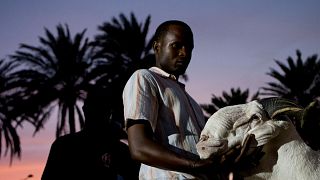Senegal
Far from the difficult Ramadan of 2020 marked by the curfew, this year's Lenten month is looking better in Senegal.
However, traders and customers alike are facing the situation created by the global health crisis as there is still a great deal of concern that food prices will soar.
Even if things seem affordable for now.
A local customer shares her thoughts on the current economic situation.
"It's not too expensive, the prices are really affordable. I have a market near my house but it is more expensive. It's almost double the price I can find here. That's why I prefer to come to this market to do my shopping because it's affordable. Honestly, I haven't noticed any price increase. "
Our special correspondent in Senegal for Africanews Wahany Johnson Sambou, reports from the ground.
"On the eve of Ramadan, as during every major event, there is always a market rush. But this is still not the case, as we see here at Castors market, one of the most important in Dakar.
Traders hope to have more customers in the coming days. In any case, more than last year when everything was slow due to COVID-19.
A pandemic whose effects are still felt as Here, it is difficult, if not impossible, to talk to a shopkeeper without mentioning the subject."
A resident butcher explains the difference between his activity last year and this year.
"It's complicated because they've just ended the restrictions. At the moment, there is a shortage of beef.
"Before, we could buy a kilo at 2,800 CFA francs (4.25 euros) and sell at 3,000 (4.55 euros). But this year, we buy at 3,000 CFA francs (4.55 euros)and sell at 3,200 (4.86 euros) or 3,400 (5.16 euros).
"So it's more complicated this year. "
More goods, but for how much longer?
In any case, the fear of a break in the distribution chain remains intense but the National Union of Merchants and Industrialists of Senegal (UNACOIS) is reassuring.
Alla Dieng, the executive director of UNACOIS, asserts there are enough food supplies to provide to the markets for this important religious month.
"As far as this month of Ramadan is concerned, I can assure you that there are stocks available for up to 45 days. So, one month and 15 days.
"Even for sugar, we have enough for three months. For gas, we have enough for 15 to 20 days. But at the same time, there are orders that have already been placed and are being sent to Senegal.
"So, before there is a stock-out, these products will flood the market.
Sambou draws an observatory conclusion.
"This is a relief for the Senegalese who are suffering at various levels from the impact of COVID-19. Now, there is one big concern for many: earning enough money to have a good Ramadan."













11:19
Cocoa is under pressure while East African economy is on the rise {Business Africa}
11:17
Bridging the legal gap in Africa’s digital boom {Business Africa}
01:54
"Great economic potential in Africa": five African leaders have lunch with Trump
11:19
Cyber Africa Forum highlights Benin's bold digital resilience [Business Africa]
Go to video
World Bank grants South Africa $1.5B for infrastructure, green energy
11:16
Angola hosts U.S.-Africa summit amid calls to revive trade ties {Business Africa}